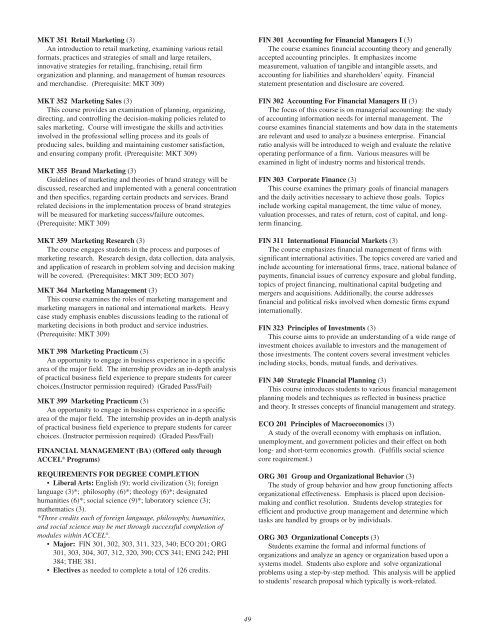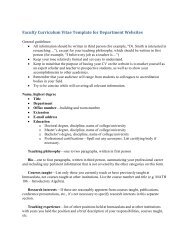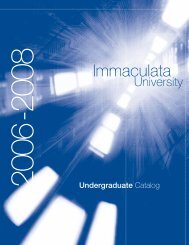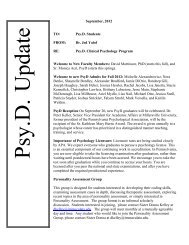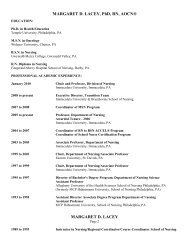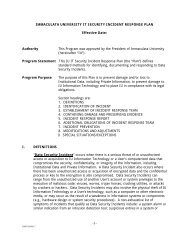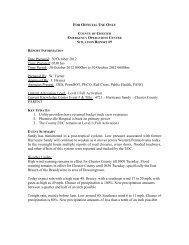Undergraduate Catalog 2008-2010 - Immaculata University
Undergraduate Catalog 2008-2010 - Immaculata University
Undergraduate Catalog 2008-2010 - Immaculata University
Create successful ePaper yourself
Turn your PDF publications into a flip-book with our unique Google optimized e-Paper software.
MKT 351 Retail Marketing (3)<br />
An introduction to retail marketing, examining various retail<br />
formats, practices and strategies of small and large retailers,<br />
innovative strategies for retailing, franchising, retail firm<br />
organization and planning, and management of human resources<br />
and merchandise. (Prerequisite: MKT 309)<br />
MKT 352 Marketing Sales (3)<br />
This course provides an examination of planning, organizing,<br />
directing, and controlling the decision-making policies related to<br />
sales marketing. Course will investigate the skills and activities<br />
involved in the professional selling process and its goals of<br />
producing sales, building and maintaining customer satisfaction,<br />
and ensuring company profit. (Prerequisite: MKT 309)<br />
MKT 355 Brand Marketing (3)<br />
Guidelines of marketing and theories of brand strategy will be<br />
discussed, researched and implemented with a general concentration<br />
and then specifics, regarding certain products and services. Brand<br />
related decisions in the implementation process of brand strategies<br />
will be measured for marketing success/failure outcomes.<br />
(Prerequisite: MKT 309)<br />
MKT 359 Marketing Research (3)<br />
The course engages students in the process and purposes of<br />
marketing research. Research design, data collection, data analysis,<br />
and application of research in problem solving and decision making<br />
will be covered. (Prerequisites: MKT 309; ECO 307)<br />
MKT 364 Marketing Management (3)<br />
This course examines the roles of marketing management and<br />
marketing managers in national and international markets. Heavy<br />
case study emphasis enables discussions leading to the rational of<br />
marketing decisions in both product and service industries.<br />
(Prerequisite: MKT 309)<br />
MKT 398 Marketing Practicum (3)<br />
An opportunity to engage in business experience in a specific<br />
area of the major field. The internship provides an in-depth analysis<br />
of practical business field experience to prepare students for career<br />
choices.(Instructor permission required) (Graded Pass/Fail)<br />
MKT 399 Marketing Practicum (3)<br />
An opportunity to engage in business experience in a specific<br />
area of the major field. The internship provides an in-depth analysis<br />
of practical business field experience to prepare students for career<br />
choices. (Instructor permission required) (Graded Pass/Fail)<br />
FINANCIAL MANAGEMENT (BA) (Offered only through<br />
ACCEL ® Programs)<br />
REQUIREMENTS FOR DEGREE COMPLETION<br />
• Liberal Arts: English (9); world civilization (3); foreign<br />
language (3)*; philosophy (6)*; theology (6)*; designated<br />
humanities (6)*; social science (9)*; laboratory science (3);<br />
mathematics (3).<br />
*Three credits each of foreign language, philosophy, humanities,<br />
and social science may be met through successful completion of<br />
modules within ACCEL ® .<br />
• Major: FIN 301, 302, 303, 311, 323, 340; ECO 201; ORG<br />
301, 303, 304, 307, 312, 320, 390; CCS 341; ENG 242; PHI<br />
384; THE 381.<br />
• Electives as needed to complete a total of 126 credits.<br />
FIN 301 Accounting for Financial Managers I (3)<br />
The course examines financial accounting theory and generally<br />
accepted accounting principles. It emphasizes income<br />
measurement, valuation of tangible and intangible assets, and<br />
accounting for liabilities and shareholders’ equity. Financial<br />
statement presentation and disclosure are covered.<br />
FIN 302 Accounting For Financial Managers II (3)<br />
The focus of this course is on managerial accounting: the study<br />
of accounting information needs for internal management. The<br />
course examines financial statements and how data in the statements<br />
are relevant and used to analyze a business enterprise. Financial<br />
ratio analysis will be introduced to weigh and evaluate the relative<br />
operating performance of a firm. Various measures will be<br />
examined in light of industry norms and historical trends.<br />
FIN 303 Corporate Finance (3)<br />
This course examines the primary goals of financial managers<br />
and the daily activities necessary to achieve those goals. Topics<br />
include working capital management, the time value of money,<br />
valuation processes, and rates of return, cost of capital, and longterm<br />
financing.<br />
FIN 311 International Financial Markets (3)<br />
The course emphasizes financial management of firms with<br />
significant international activities. The topics covered are varied and<br />
include accounting for international firms, trace, national balance of<br />
payments, financial issues of currency exposure and global funding,<br />
topics of project financing, multinational capital budgeting and<br />
mergers and acquisitions. Additionally, the course addresses<br />
financial and political risks involved when domestic firms expand<br />
internationally.<br />
FIN 323 Principles of Investments (3)<br />
This course aims to provide an understanding of a wide range of<br />
investment choices available to investors and the management of<br />
those investments. The content covers several investment vehicles<br />
including stocks, bonds, mutual funds, and derivatives.<br />
FIN 340 Strategic Financial Planning (3)<br />
This course introduces students to various financial management<br />
planning models and techniques as reflected in business practice<br />
and theory. It stresses concepts of financial management and strategy.<br />
ECO 201 Principles of Macroeconomics (3)<br />
A study of the overall economy with emphasis on inflation,<br />
unemployment, and government policies and their effect on both<br />
long- and short-term economics growth. (Fulfills social science<br />
core requirement.)<br />
ORG 301 Group and Organizational Behavior (3)<br />
The study of group behavior and how group functioning affects<br />
organizational effectiveness. Emphasis is placed upon decisionmaking<br />
and conflict resolution. Students develop strategies for<br />
efficient and productive group management and determine which<br />
tasks are handled by groups or by individuals.<br />
ORG 303 Organizational Concepts (3)<br />
Students examine the formal and informal functions of<br />
organizations and analyze an agency or organization based upon a<br />
systems model. Students also explore and solve organizational<br />
problems using a step-by-step method. This analysis will be applied<br />
to students’ research proposal which typically is work-related.<br />
49


